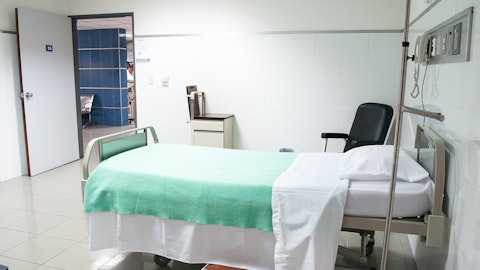Gena Wang: I have 2 quick questions. Doug, you mentioned that there are still remaining questions from the FDA. What are the natures of these remaining questions? And do you expect late-cycle review will be mainly focusing on these questions and no new questions remaining? And the second question is regarding the 3 sites. Do any of these 3 sites have established commercial experience with iCELLis manufacturing?
Doug Ingram: Well, there’s not a lot — there’s not a ton of history. I’ll answer the last question first. I remind you that what we’re doing is not a first is nearly a first. So you’re not going to find a lot of organizations around the world are going to have an enormous amount of experience with commercial iCELLis unless they happen to be Novartis. What I will say is — so when we’re in an active review, one of the things I tried to make the point of in my script is that we provided detail about the mid-cycle review, frankly, because there was this significant interest in whether we were having an advisory committee or not. We’re now in the active review itself. It’s an ongoing dialogue and questions and answers. And in respect of that discussion and dialogue with the agency item, I’m not going to go into a ton of detail along the way.
There will be a late-cycle review and then we’ll see where we are. The inspections will be completed. And then if all goes well, of course, you’ll have an answer certainly by May 29. And we hope it’s a positive one. We certainly think the patients deserve it.
Operator: Next question is from the line of Ritu Baral of Cowen.
Ritu Baral: Doug, just back to the Adcom for a second. When FDA put in their minutes, they were going to have an Adcom and now they’re saying they don’t. It sounds like they had a question around the biomarker that at least they figured out that they can answer on their own at this point. Does that revolve around any additional data sets or analysis around the ongoing or follow-up for 102 or 103 that they’ve requested that you’ve submitted? Or is it really just sort of questions as you’ve discussed? And then just a quick one on CMC. The plants, the Harmon plant and the 2 others, have you done — completed mark inspections at all of them? Are you inspection-ready?
Doug Ingram: I’ll answer the last question first. We are undoubtedly inspection-ready. We’re just saying that. We’re an organization that doesn’t want to get surprised. So we are very much inspection-ready and we’ve done all the work to put ourselves in a good position. And that gets to the first — to get the first — the answer to the first question as well. So let me make sure I dispel perhaps a misunderstanding. There wasn’t a point in which the agency said to us in writing that you’re going to have an Adcom and then later determined that we didn’t need an Adcom. What did occur is that we said in connection with the BLA submission that we should all assume there’s going to be an Adcom. And given an opportunity to do this the second time, I would do that exactly the same way a second time.
Why? Because we needed to be ready for an advisory committee meeting. There’s an enormous amount of work that goes into preparing for an advisory committee meeting and we wanted to make sure that we had a mindset that had us in a good position. So that to the extent that the FDA, the division determined that it was wise or necessary to take external scientific advice that we’d be well prepared to participate in that Adcom. It was at the mid-cycle review, both in the written agenda and at the mid-cycle that the agency had — has, for the first time, told us that they don’t need an Adcom for this fall. So that’s where we are with respect to that.
Operator: Our next question comes from the line of Joe Schwartz of H.C. Wainwright.





